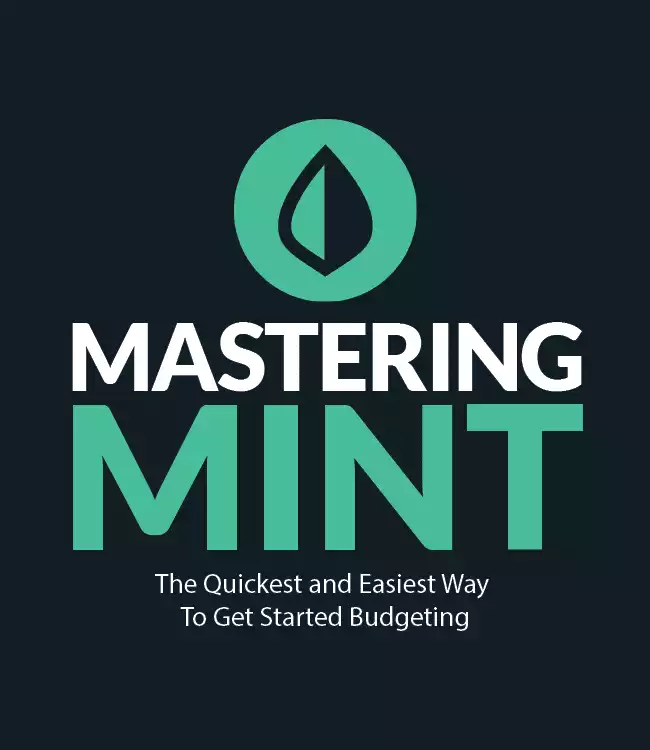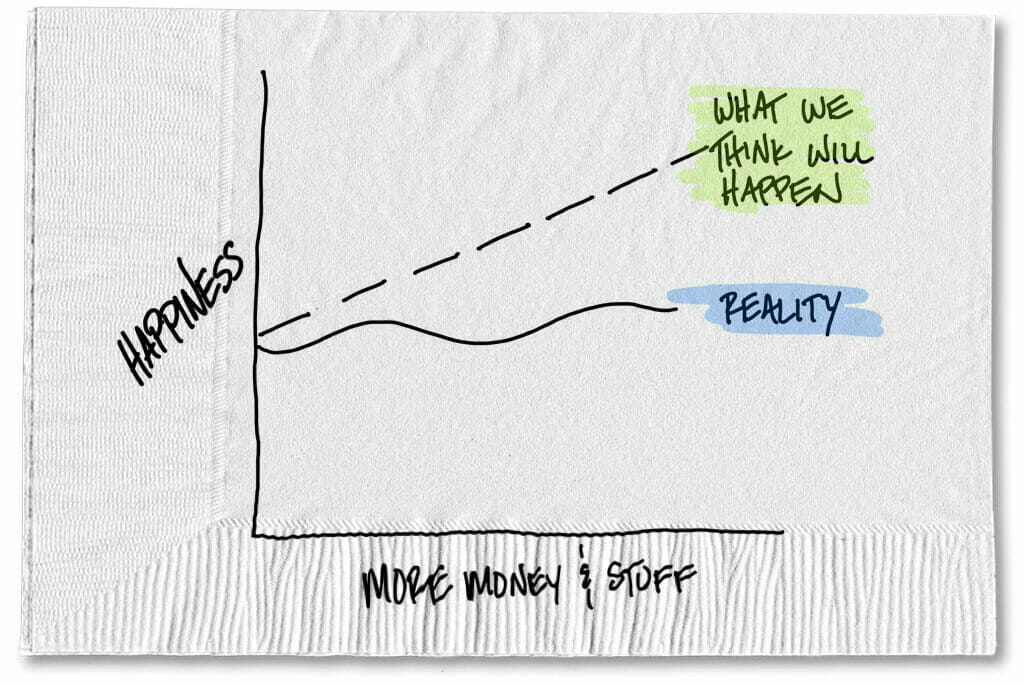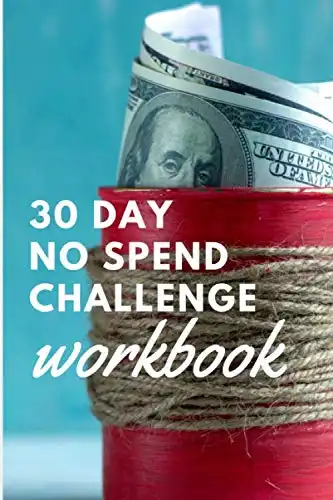Do you hate your job and your life? Do you have a house full of stuff? You work so that you can buy things, and those things keep you chained to that desk working. Your materialistic lifestyle is killing you.
What is the concept of materialism?
In the United States and many other countries worldwide, we’re obsessed with materialism.
Not only do we want all the stuff, we silently compete with each other to try and have the best, biggest and most stuff possible.
This obsession can manifest through buying one big, flashy thing like a giant McMansion. Or it can show itself through a series of smaller purchases like endless closets full of clothes, progressively flatter, bigger televisions, and the latest version of any Apple product being produced.
This materialism forms the basis of our economy.
That’s our entire economic system: buy things. Everybody buy. It doesn’t matter what you buy. Just buy. It doesn’t matter if you don’t have money. Just buy. Our entire civilization now rests on the assumption that, no matter what else happens, we will all continue to buy lots and lots of things.
Buy, buy, buy, buy, buy. And then buy a little more. Don’t create, or produce, or discover — just buy. Never save, never invest, never cut back — just buy. Buy what you don’t need with money you don’t have… Buy like you breathe, only more frequently.
What are the three types of materialism?
Philosophical Materialism: Physicalism is the belief that the fundamental substance of reality is material or physical in nature. According to this view, physical properties and processes can ultimately explain everything that exists, including consciousness and mental states.
Historical Materialism: Developed by Karl Marx and Friedrich Engels, historical materialism is a sociopolitical theory that posits that the economic and material conditions in a society shape its historical development, social structures, and institutions. This perspective emphasizes the importance of class struggles, production relations, and economic forces in understanding societal changes.
Cultural Materialism: This is an anthropological theory that emphasizes the role of material conditions, such as technology, environment, and modes of production, in shaping human culture, beliefs, and behavior. Cultural materialists assert that the way people organize their societies and create meaning is primarily driven by their need to adapt to and transform their material world.
This is our guide to budgeting simply and effectively. We walk you through exactly how to use Mint, what your budget should be, and how to monitor your spending automatically.
What is an example of materialism?
It’s not just down to your own materialism and lack of willpower driving this.
Marketing Genius
In America, we’re conditioned for this nearly from the cradle. Take the example of Coca-Cola, a company that has very effectively used classical conditioning for decades. Thirst is an unconditioned response. We get thirsty due to outside forces like the being in the heat or sweating while exercising or playing sports.
Through its marketing, Coke has associated itself with these activities, people drinking a “refreshing” Coke on a hot day at the beach or after a hard-fought game.
And it doesn’t hurt that the people drinking the Cokes are fit and attractive.
These images and their messages worm their way into our unconscious. Now we want a Coke not only in instances when we feel thirsty but also when we’re on the beach or after a game (or merely at a game) or even when we just see a Coke sign.
If we drink a Coke, we’ll be fit and attractive like the people in the ads, or at least we can do what attractive people do.
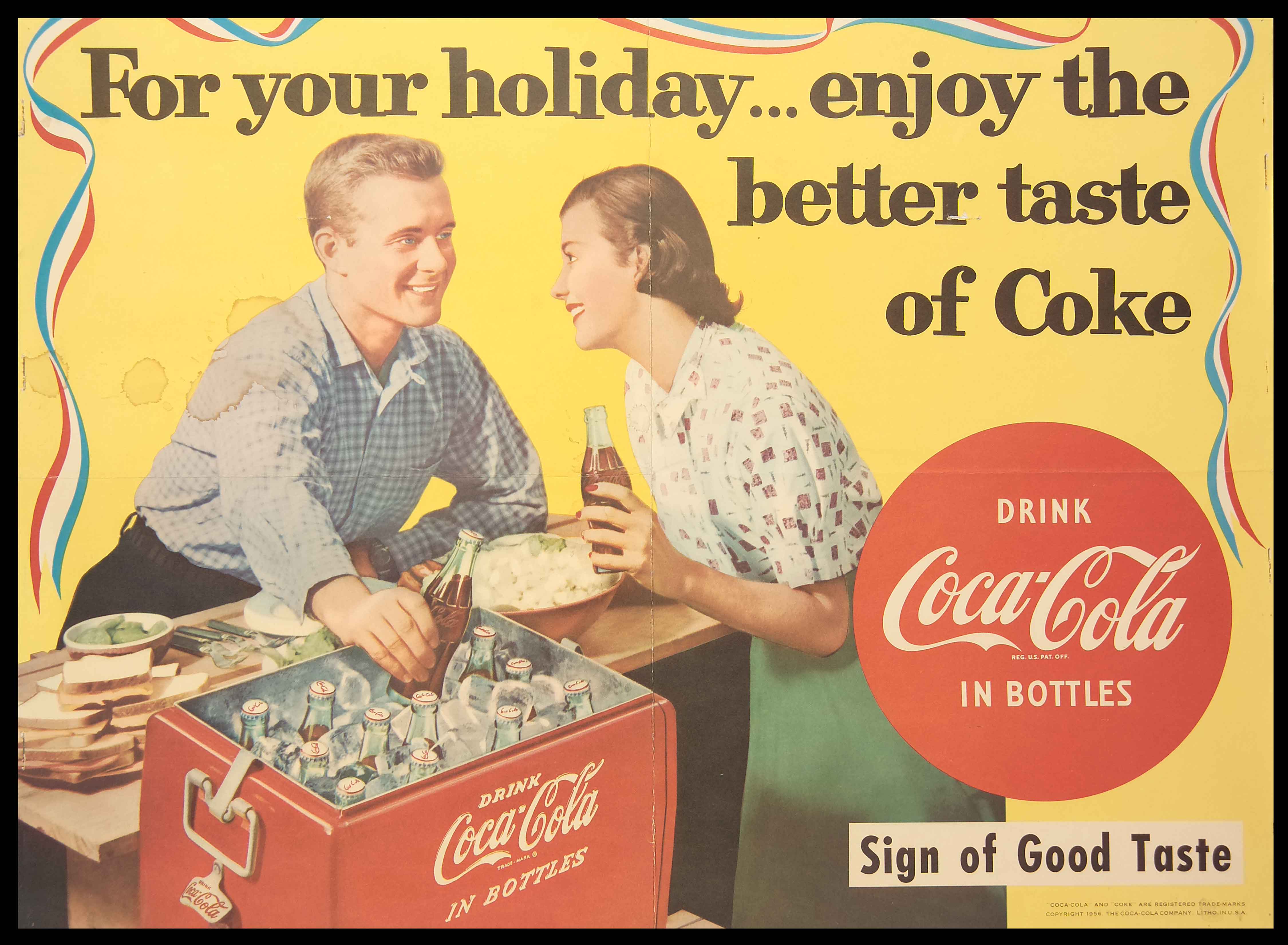
This kind of conditioning through advertising make us buy a product, Coke in this case, even if we don’t need a Coke because we aren’t actually thirsty.
It’s easy to see how this example extrapolates out into buying things other than Coke, things that are much more expensive than a Coke. And this is just one example. You don’t want to know what these corporations do to get you to buy and eat junk food. The human brain is easily highjacked.
And Then There’s Social Media
Most of us have at least one social media account, and that is making us buy stuff too. 74% of consumers use social networks to help make buying decisions. I’ll cop to it. I saw a Brooklinen ad on Facebook and bought a set of sheets. They’re awesome.
Because social media platforms have so much information about us, it’s easy for companies to use targeted marketing to sell to us. We’re targeted by location, demographics, our interests, and even our behaviors.
A study found that those who spend a lot of time on Facebook and who have a lot of friends are more likely to have credit card debt and lower credit scores than those who spend less time on the site and have fewer “friends.”
Those who see celebrities wearing a particular item of clothing on social media are often moved to buy it too. This is evidenced by the phenomenon of an item of clothing worn by the young, female British royals often selling out almost as soon as the photographs of them in it are posted.
In fact, a whole company, The Royal Look For Less, has recently sprung up solely dedicated to selling inexpensive knockoffs of clothes worn by Kate Middleton and Megan Markle. If you like beige dresses and nude tights, this site is your new home page.
This All Leads To An Interesting Phenomenon
You might suspect all these ends in tears, and you’re right. Here is what can happen when you live to buy, buy, buy.
We’re not starving, homeless, and naked.
Why do we get out of bed five or so days a week and go to work? Well, because we need money to feed, house, and clothe ourselves and our families. But how much do those things cost? In most developed countries, food is reasonably affordable.
Governments, most notably the French monarchy, found out what happens when people can’t afford to feed themselves. The peasants had no bread and rather than eat cake, (Marie Antoinette almost certainly did not say that) they decided to eat the rich.
Because no one was looking for a repeat, most governments since have gone to some lengths to ensure that people have enough to eat.
Although housing is becoming increasingly expensive, (while wages remain stagnant) most of us can afford a place to live too even if it means bunking with roommates or living with family.
And while we’re not all kitted out in Chanel couture, it’s been a while since I’ve seen anyone naked in public (well, since Mardi Gras). So most of us are affording the big three.
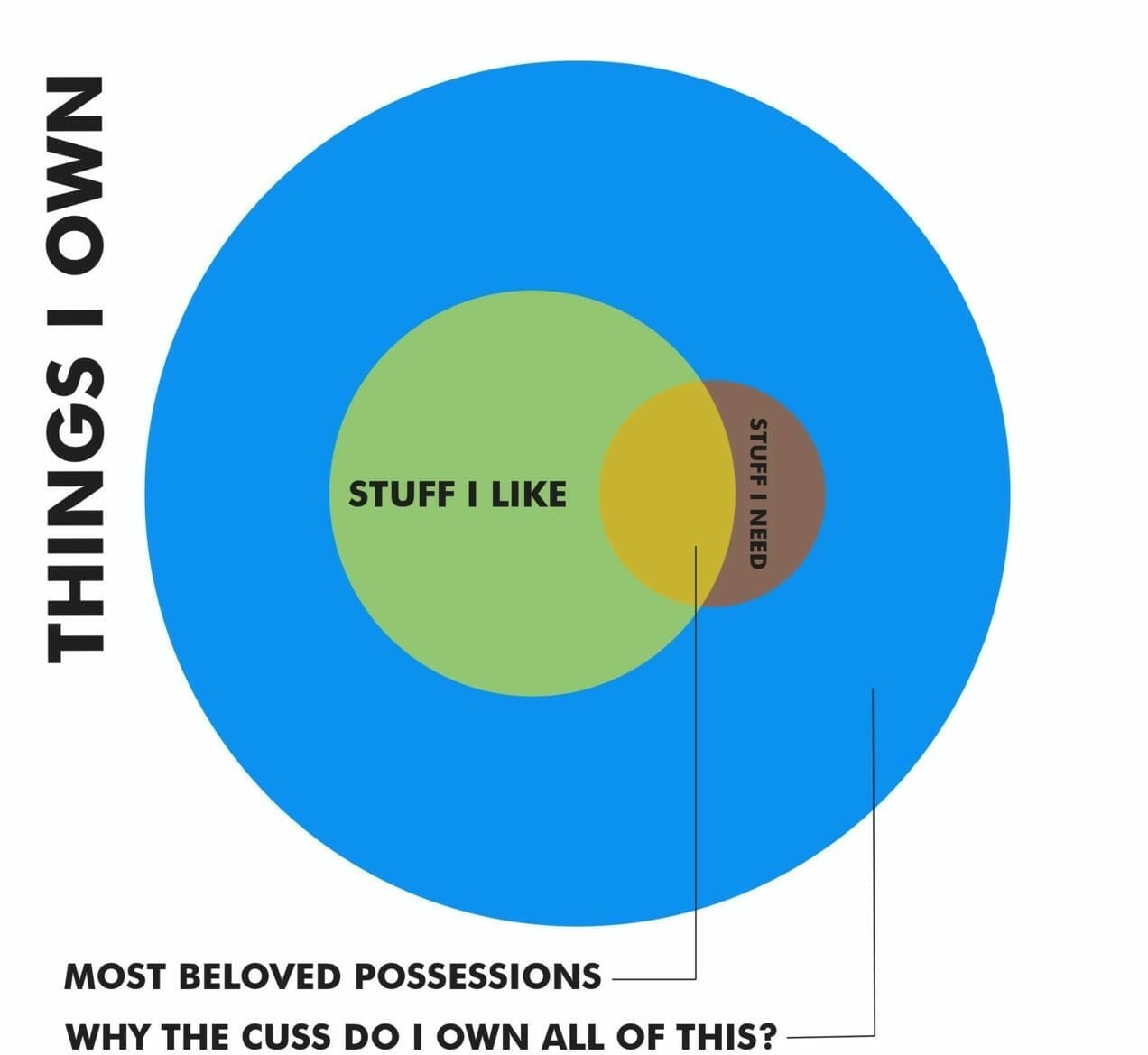
$500 Grand a Year and Broke
So why are so many of us drowning in debt, living paycheck to paycheck, barely making ends meet?
If you’re having a pleasant day and want to ruin it by reading some anger porn, have a read of this.These assholes are making half a million dollars a year and crying poverty.
You might not be quite this bad, but the sentiment is the same. After we meet those core needs, we still have some money left over. What should we do with it? Invest it, save it, give it away? No! Let’s buy stuff, lots of it! Stuff will make us happy!
Whoever said money can't buy happiness doesn’t know where to shop.
Tweet ThisBut does it make you happy?
Selling Your Life Hour by the Hour
How often do you wake up and say to yourself “I wish I didn’t have to go to work”? Or worse than that to me, how many of you feel that dread set in around 5:00 pm on Sundays? I hated that feeling when I was working a 9-5.
Do you love your job? If you weren’t getting paid, would you still do it? Can you think of better, more rewarding ways to spend your time? You probably only go to your job because you’re being paid to show up, not because you enjoy what you do.
If you didn’t have to work, you’d be a lot happier, a lot freer.
What people fail to realize, or refuse to acknowledge is that everything you buy outside of your core needs leads you further from happiness, from freedom.
Because when the majority of the money you earn at a job you hate is spent on stuff, you don’t need, what you’re doing is selling your life, your happiness, and your freedom one hour at a time.
Do the math. If you want a new $1,000 iPhone and you make $20 an hour (pre-tax), you have to work 50 hours, a full work week, two work days, and two hours, to afford the phone. Shit! Really? Read it and weep.
Even if you’re salaried, you can still work out how much you get paid an hour. Do that and before you buy something, work out how many weeks, days, and hours you’ll have to work to pay for it.
When you look back at the iPhone purchase, what would you rather have had, the phone or seven days free from being at your soul-sucking job?
If you added up the cost of all the crap you simply had to have that is now sitting in a closet or attic or garage, taking up space both mental and physical, collecting dust, unused, you could probably shave years off your working life.
It’s a sobering realization. If you can’t quite come to grips with the idea of buying less, think of it in terms of working less. In chasing this goal of happiness, you should not only strive to buy less stuff you don’t need, but you should strive to work less as well.
Breaking Out
Now that we recognize the problem and know what’s behind it, what can we do to break out?
The Sweet Spot
In 2010 a study from Princeton University was published citing $75,000 as the annual salary you need a year to be happy. The lower a person made under that amount, the unhappier they were, but no matter how much more a person made, $1 million, $75 million, $10 billion, they reported no greater degree of happiness than those at the sweet spot of $75,000.
Adjusted for inflation, that is now $106,079.52. So it’s not minimum wage, but it’s not Bezos money either.
Buying Happiness
Money can buy happiness and in more ways than one, but none of them have anything to do with buying stuff.
Freedom
Money can buy us happiness when we use it to buy freedom. Where do you buy freedom, the freedom store? Is it next to the gun store? That’ not what I mean! Freedom is having choices, and money buys you choices.
If you have money in the bank and you hate your job, you can quit even before you’ve lined up another. Or you can quit and start your own business. If you hate where you live, you can use your money to live somewhere else, a different house, a different town, or even a different country.
Time
What do people often wish they had more of? Money is probably the first response and the second is often time. We all have the same 24 hours in a day, but when you have money, you can use it to buy more time.
How? Commuting is a good example. If your job is in a city and you can afford to live in the city which is often more expensive than living in the suburbs or countryside, your commute is shorter than someone who can’t afford to pay city rents.
We all need to have a clean home, clean clothes and food to eat but cleaning, laundry, and cooking take time. If you have money, you can hire people to do those things for you.
Good Karma
If you want to use your money to buy happiness, give it away. Being generous has been scientifically proven to increase happiness. It doesn’t have to be a lot either, just buying a cup of coffee for another person makes us happy.
It makes us healthier too. Studies have shown that older people who are generous enjoy better health.
Spending money on others can be as effective at decreasing blood pressure as taking medication or exercising (exercising makes us happy too).
Helping others gives us a longer life, maybe because doing so reduces stress and stress is bad for our health, happiness, and longevity.
Buy Experiences
We’re not telling you not to spend money on anything apart from the bare necessities. That’s no kind of life. But if you want to buy happiness, buy experiences rather than things. It’s been shown that buying something like concert tickets makes us happier than buying something like a new outfit.
When you buy an experience you buy anticipation, often a shared experience, and memories. When you buy a thing, well, you have a thing, and that’s it.
Getting There
This all sounds good, but how do we get there? The bar is not as high as you might have thought, you don’t need to make a million dollars a year to be happy, but between $50,000 and $65,000 (source). But the median household income in the U.S. is that depending on where you live.
So how can we get to the sweet spot without putting in more hours at a job we hate?
Get Rid of Debt
The only thing more soul-sucking than a job you hate is being saddled with debt. If you have credit card debt, your focus needs to be getting rid of it. Attack it with the snowball or stacking method so you can pay it off efficiently.
Consider getting a balance transfer card so you can get the principal paid off without paying interest. Get a loan from a company like Upgrade. You’ll still have debt, but the interest rate will be considerably lower than what you were paying to the credit card companies.
If you have student loan debt refinance it with Credible. You can often lower your interest rate and even refinancing for a rate 1% lower than what you’re currently paying can save you thousands of dollars over the life of the loan.
Invest
Investing is the most important step to take if you want to achieve financial freedom. When you invest, your money is making money for you. Open a M1 account. Contribute to your employer’s 401k.
Consider real estate investing as the ultimate form of passive income. You don’t need a lot of money to do it nor do you have to become a hand’s on landlord. You start investing in real estate with Fundrise.
Do A Freeze
Pick a month and do a spending freeze. A spending freeze means you don’t spend any money apart from what is absolutely necessary, housing, utilities, groceries, etc. You don’t go out to dinner or for drinks; you don’t buy any clothes, you don’t get your nails done. Nothing apart from the essentials.
See how it goes. Do it in February which is the shortest month and in most places, it’s too cold and miserable to go out anyway.
What happened? Were you just completely miserable, laying on the kitchen floor bawling? Probably not. Even if you were, take a look at your Mint account for the month. Is there more money in there than usual? Almost certainly.
Put it on a List
If you’re about to buy something that you know you don’t really need, write it down and wait for 30 days (the 30 day rule). If that 30 days passes and you still want whatever it was, you can buy it. But what is likely to happen is that you’ll have forgotten about that thing long before the 30 days is over.
Using the 30-day list method will go a long way to curbing impulse buying which is where a lot of us get into trouble.
Less Work, More Happiness
It’s important to realize that you’re a slave to your stuff. Recognize this, and you can free yourself. Materialism is killing you, but it’s never too late to break the habit.
Maybe your goal shouldn’t be to save money, maybe your goal should be to save yourself and your happiness. Be selfless in a way that will actually increase your happiness. You should also be absolutely selfish. Selfish with your time. You have a limited amount you shouldn’t be wasting it working for meaningless things. Work less, play more.
It's painful knowing that all those small transactions add up to big money. It's exciting to think of trying out a no spend challenge, but it also seems daunting. It doesn't need to be so intimidating. This workbook will guide you through a no buy month while keeping your sanity intact.
